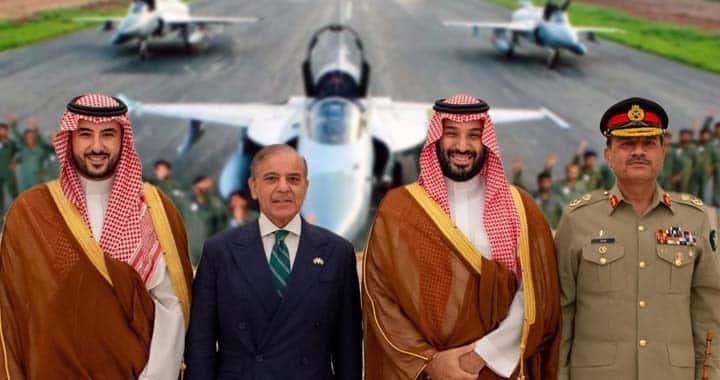For decades, Pakistan’s Army has been accused of being a “force for hire,” dispatched to faraway deserts for the right price, subcontracting security in exchange for aid and favors. But such labels miss the deeper truth. When the Muslim world has faced existential crises from the burning streets of Amman in 1970, to the missile-scarred oilfields of Saudi Arabia, to the upheavals of Bahrain in 2011 it was Pakistan’s soldiers, not Western contractors, who were trusted to restore order.
On September 17, 2025, when Pakistan and Saudi Arabia signed the Strategic Mutual Defence Agreement in Riyadh, the cynics pounced again. “A mercenary pact,” some called it. “A desperate move by Islamabad,” others claimed. Yet the reality is far richer, more complex, and far more flattering to Pakistan’s enduring role.
This pact is not about mercenary service. It is about Pakistan’s transformation into the indispensable security backbone of the Muslim world. The narrative of Pakistan’s military presence in the Middle East is not new. It stretches back over half a century.
In 1970, Brigadier Muhammad Zia-ul-Haq later Pakistan’s president was deployed to Jordan during the Black September crisis. Palestinian factions threatened to destabilize King Hussein’s rule. It was Pakistani officers who coordinated the defense of the monarchy, a role that cemented Pakistan’s image as the guardian of Arab order in times of chaos.
During the Iran–Iraq War of the 1980s, Saudi Arabia looked east not west for a promise of protection. Pakistan quietly assured Riyadh that any attack on the Kingdom would be treated as an attack on Pakistan itself. Pakistani troops were stationed in Saudi bases, not for conquest, but for deterrence.
When Saddam Hussein invaded Kuwait in 1990, Pakistani contingents once again took their posts in Saudi Arabia and the UAE. They were not the ones commanding the airstrikes—that was the U.S.-led coalition. But they were entrusted with internal security, training, and the safety of holy sites a duty no other military in the world could have credibly carried.
Fast forward to 2011. As Bahrain’s Shia-majority population, inspired by the Arab Spring, rose against the monarchy, Saudi Arabia intervened with its Peninsula Shield forces. But behind the scenes, Pakistani recruitment channels lit up. Thousands of ex-servicemen riot police, instructors, special forces were flown to Manama. Within months, Pakistanis formed nearly half of Bahrain’s National Guard. It was not the West, not the Russians, not regional contractors but Pakistan that provided the human shield for a nervous Gulf monarchy.
These episodes were not acts of desperation. They were the continuation of a trusted pattern: when Arab rulers need soldiers they can rely on, they turn to Rawalpindi.
Saudi Arabia’s arsenals glitter with Western steel. F-15SA fighter jets scream over Riyadh. Patriot and THAAD batteries track hostile missiles. Abrams tanks sit in desert depots. Billions of dollars in U.S. and British weapons contracts sustain the Kingdom’s defense. But weapons, no matter how advanced, cannot man themselves. Technology does not inspire loyalty. Silicon cannot guard shrines.
Pakistan brings what no arms deal can buy: trusted human expertise, battle-tested professionalism, and Islamic solidarity. Saudi pilots may fly Eurofighter jets, but Pakistani trainers taught many of them. Saudi commanders may plan with U.S. advisors, but when holy sites need guarding, it is Pakistani boots that march on the sand. This is the essence of the new Saudi–Pakistan pact. It supplements Western firepower with Muslim manpower—a partnership of deterrence, legitimacy, and credibility.
Yes, Pakistan is in economic distress. Its reserves are dwindling. Multinationals are leaving. IMF deadlines loom. But here lies the paradox: out of weakness emerges opportunity. For Pakistan, exporting security is not humiliation it is strategy. For decades, Pakistan has been the largest contributor to UN peacekeeping missions, sending over 230,000 troops across 28 countries. From Congo to Sierra Leone to Haiti, Pakistani blue helmets have stood between civilians and warlords. They did not serve for cash, but for credibility.
The Gulf deployments fall in the same tradition. They are not mercenary ventures but strategic exports of stability earning Islamabad both economic relief and geopolitical capital. Every Pakistani battalion in Riyadh or Manama is not just a paycheck; it is a reminder that Pakistan is the world’s trusted Muslim stabilizer.
The critics call Pakistan’s Army a “state within a state.” They are not wrong about its power. With $39.8 billion in assets, its foundations and enterprises span banking, agriculture, energy, and construction. But what they miss is that this institutional strength allows the Army to negotiate state-to-state defense pacts on equal terms. It is not a subcontractor—it is a transnational actor.
And unlike contractors, it carries something priceless: nuclear credibility. For Saudi Arabia, aligning with Pakistan is not just about troops. It is about standing beside the only Muslim-majority state with nuclear weapons a deterrent power that signals to rivals: aggression here will not be easy.
This is why the Saudi Pakistan pact matters. It is not merely symbolic. It is not merely mercenary. It is the institutionalization of a reality that has existed for decades: Saudi oil wealth and Pakistani martial strength together form the spine of Islamic security.
Saudi Arabia remains anchored to U.S. defense frameworks but in moments of vulnerability, it still turns to Pakistan. Pakistan, in turn, gains not just aid but prestige: a reaffirmation that, despite its domestic struggles, it remains central to the security calculus of the Gulf.
So is Pakistan’s Army for hire? To its critics, yes. But peel back the cynicism, and a different story emerges. From Jordan’s bloody streets to Bahrain’s restive alleys, from Saudi deserts to UN frontlines, Pakistan has been more than a hired gun. It has been the relentless shield of the Muslim world, the force of last resort when faith, sovereignty, and stability are at stake. And that is why the Saudi–Pakistan pact is more than a deal. It is a declaration: when the Muslim world needs a defender, it does not look to Washington or Moscow.
It looks to Pakistan.





